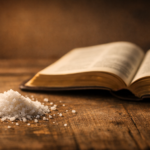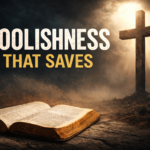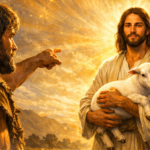
Text: John 6:22-35
Theme: “A feast of food”
___________________________
Intro – According to a scientist’s research, a human being eats about 16 times its own weight in one year. The same source also says that a horse on its turn takes in only 8 times its weight. Conclusion? If you want to lose weight you have to eat like a horse.[1]
Food and weight loss are topics that go hand in hand in today’s world. So much so that we could some people might pray “Don’t give us this day our daily bread”. Food is available everywhere in overwhelming quantity, almost in excess, generating a time in which that we can even afford skipping a meal – something unthinkable in a not-too-distant past, when people had to fight harder to put bread on the table, and throwing food in the garbage was almost a mortal sin.
Speaking of our relationship with food and weight loss, we can think also of eating disorders like Anorexia – when someone refuses to eat because they think they are always overweighted, or Bulimia, when after eating people want to bring it back out, again, to avoid gaining pounds. This may leave one wondering: what leads a human being to be afraid to eat, avoiding it altogether, one of the most basic actions and pleasures we have in life?
All this introduction about food comes from a reflection on the Gospel today, when Jesus talks about bread. But not a regular loaf. It is Bread from Heaven. So here I would connect food and nutrition to a spiritual question: Can this type of relationship with food, and especially nutrition disorders happen in spiritual life? Could we fall prey of skipping spiritual meals, or get caught in Bible Anorexia, or Bible bulimia?
Jesus offers the Bread of Life. A bread, He says, which is Himself: “he who comes down from heaven and gives life to the world.” Bread that comes down from Heaven? What is it connected to? Where can I find it?
1 – The text
The words of Jesus recall the miracle of the multiplication of the loaves. The Master had fed thousands with only five loaves, providing food for their bodies. Now, He shifts the focus of the conversation to food for the soul. Jesus turns their attention from the physical bread to the bread of life.
Jesus knew that the people were seeking an earthly king and someone who could make food appear was a great candidate. Since He had already shown his power to heal people too… hey, free food and free health care? Such a king would seem perfect for the throne. “Let’s crown him!” Yet, Jesus is not interested in earthly glory. Therefore, He declares, “I am the bread of life that came down from heaven.” His food and the health give believers eternal life, not just temporary satisfaction or healing.[2] Jesus admonishes them, “Do not work for the food that perishes, but for the food that endures to eternal life, which the Son of Man will give to you.” What work is required? “That you believe in him whom he has sent.”
At this point, the Jews ask for a sign. They also bring to the conversation the Manna. It was the food from heaven, who sustained the people of Israel for 40 years in the desert. That was a heck of a sign, wasn’t it? Now, what does the Nazarene Rabbi has up His sleeve to impress us? Perhaps then we will be more open to follow you.
Sometimes we may be those unbelieving, Christ-testing Jews. What are the signs we demand from God in order to with more confidence take Jesus seriously and believe in Him once and for all? “Lord, if you…then….”. Adding to this, we may become skeptical about the “Free food” he offers abundantly. For you know, “there is no such thing as a free meal.” The notion of free gifts from Heaven seems like a scam. “Hum…nothing is this world is for free. I must do my part to please God, earn His blessings, and somehow deserve to be with Him.” But this is precisely what the Father did—He sent His Son, the Bread of Life, freely given. The food that nourishes and sustains believers not for 40 days or 40 years. It gives a life that will never end.
2 – A Feast of Food
As we talk about feeding our faith, we think about what the adequate way is to feed our souls. When we need relief, strength or comfort in difficult situations, we can be tempted to turn to various types of spiritual “drive-throughs” offering seductive fast food for the soul. Fast food has been a staple in modern life for quite some time. While it can sustain us, we know it is not the ideal way to nourish our bodies. In the same way, we may turn to spiritual fast food, looking for easy and quick solutions to satisfy our hearts. Instead of the Bread of life, we feast on the bread of death surrounding our tables: the devil and the world, challenges to our faith, and the feeling of spiritual starvation. We often consume spiritual fast food, which is bad for the heart and leaves us malnourished.
Christ doesn’t offer us fast food. He offers a feast of Food. From the Gospel of John, we learn that this feast centers around one main dish: the Bread of Life. This bread satisfies, relieves, strengthens, and sustains us so that we can always have healthy food for our soul. Jesus, the Bread of Life, offers sustenance that transcends the temporal and the perishable. He provides nourishment that lasts for eternity, bridging the gap between our earthly needs and our eternal destiny. By believing in Him, we partake in the true bread from heaven, ensuring our spiritual sustenance forever
As the saying goes, and we hear it a lot, “life is short”. But it can be even shorter if we consume unhealthy food. Similarly, our spiritual life is at risk if we feed on breads of death. When we partake of the Bread of Life—Christ—we know our soul is being fed, our life is being nurtured, and even our emotional health is being nourished. We can anchor our feelings to what we know and have learned from the Word of God. Christ came down from Heaven to be our Bread of Life.
“Pastor, you say the Bread of Life satisfies us. But I don’t always feel like that. How do I know that I can feel satisfied?” Yes, as we live in a time of an empire of the senses, where almost everything seems to be a matter of feeling, this has permeated our daily language. We often say, “I feel like…” or “I have a feeling that…” even when feelings are not relevant to the subject at all. For example, “I feel that tomorrow is going to rain”. “I feel that my car needs new tires.” “I feel that I am overweight”. We have become so accustomed to this way of thinking that we rarely question it.
Truth is: You can’t always rely on what you feel. But you can always rely on what you know. If your body’s nourishment depended solely on how you felt about it, how well-fed would you be? However, when you eat food, you know your body is going to be nurtured. When you eat the feast of food that Christ offers, you know your soul is being fed, your life is being nurtured. Even your emotional health is being nourished, because you know you can latch your feelings on to what you know and have learned from the word of God.
Jesus is the Bread of life that came down from Heaven to be our Bread of life. He came down from a special place to this world of sorrows and pain. We cannot downplay how big this is. Think about this quote: “Every boy wants to be a man. Every man wants to be a king. Every king wants to be a God. Only God wanted to be a boy.”[3]
Jesus, True God, humbled himself and came down from Heaven to be with us, not only through His Word and Sacraments in the Divine Service but every single day of our lives, giving meaning to our existence and direction to our steps.
Cc – In the end still one question could be asked: “I know I need food. But how much of it should I have, how much should I eat, or take with me for the journey?”
Some time ago, in Regina, a couple of friends visited with us coming back from a big, long trip. On their motorhome they set to travel across Americas, South to North. They started their trip off in Ushuaia, Argentina, the southernmost point in the Americas, and finished it in Northern Alaska. Almost 15,000 km, or 9,000 miles. Now, how much food did they take with them for that road trip? 5 loves and 2 fish? Well, unless Jesus literally travelled with them, I don’t think that would be enough. They had to have a full pantry right off the bat. You might add also, they surely had also many pit stops along the road to refuel and to refill their pantry. And that’s correct.
Now think of your life: you’ve been travelling from the deep end of sin, brought into God’s Faith home and is travelling to the up north – Heaven. How does that trip look like? Do we think we can make it without a full pantry? Or even without Sunday and daily pit stops for refill and nourishment? Certainly not. We need food for the long haul. We constant nourishment from the one who is present with us in that trip, multiplying our food for faith, bringing the Bread of life that actually will make us not to be hungry anymore. The feast of food that nurtures your faith. Go ahead and eat it like a horse. Or better – like His sheep.
_________________________________
[1] https://www.sermoncentral.com/sermons/soul-food-cedric-portis-sermon-on-bible-study-39745
[2] This “I am” statement is one of the seven “I am” declarations Jesus makes. He is the Bread of Life and gives the Water of Life. He is the food that came from heaven to sustain us, not just for 40 years, but for eternity.
[3] https://homemvaloroso.wordpress.com/2015/10/02/frase-leonardo-boff/






